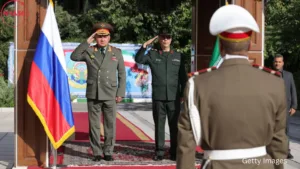Global markets experienced a loss of $2.9 trillion as tensions in the Middle East intensified.
The global financial markets have undergone a significant decrease, with an astonishing $2.9 trillion lost due to increasing concerns over potential Iranian attacks on Israel. The unrest has been intensified by recent events, such as the visit of Sergei Shoigu, the director of Russia’s National Security Council, to Iran, and a rise in the number of Russian cargo flights touching down in the nation. These actions have sparked speculation of an impending military conflict that might have significant implications for regional stability and global economic well-being.

Global investors are responding to the increasing geopolitical tensions by withdrawing from more volatile assets, resulting in a substantial decline in stock indices across key markets. The Dow Jones Industrial Average, NASDAQ, and S&P 500 in the United States have experienced significant falls, while European and Asian markets have also incurred considerable losses. The widespread decline in stock prices is a result of increasing worries about the possible interruption of oil distribution and the wider consequences of a conflict in the Middle East, a region that plays a crucial role in global energy markets.
Alliance between Russia and Iran
The presence of Sergei Shoigu in Iran indicates an intensifying partnership between Russia and Iran, prompting concerns about the strategic collaboration between the two nations. Shoigu’s visit to Tehran follows the recent arrival of many Russian cargo planes in Iran, indicating the potential exchange of military equipment or troops. This development highlights the complex geopolitical strategy being employed in the region, where Russia may use its alliance with Iran to challenge Western influence and assert its dominance.
Israel and Responses from the Region. Prime Minister Benjamin Netanyahu’s relocation to a heavily fortified command bunker in Jerusalem Israel indicates the seriousness of the situation. The bunker, currently in full functionality, is specifically engineered to safeguard the Israeli leadership in the event of a significant confrontation. Netanyahu’s choice to move to the bunker suggests that Israeli intelligence evaluates an Iranian attack as not just feasible but also impending.

However, the reactions from different regions have varied. Egypt has categorically declared its refusal to engage in Israel’s defense against Iranian attacks. The statement from Cairo emphasizes the intricate network of alliances and hostilities in the Middle East, where long-standing animosities and present-day geopolitical considerations frequently determine national strategies. The position taken by Egypt has the potential to further isolate Israel, leading to an increased dependence on its military forces and its strategic alliance with the United States.
Possible Consequences for Worldwide Oil Availability. An imminent worry for the worldwide economy is the possible disturbance to oil provisions. The Middle East continues to serve as a vital center for both the production and transportation of oil on a worldwide scale. If a major conflict were to occur in the region, it may result in a sudden increase in oil prices, which would have serious consequences for world markets and economies. The Strait of Hormuz, a crucial bottleneck where a substantial amount of the global oil supply traverses, would be exceptionally susceptible in the case of armed conflict.

In addition to the energy industry, a conflict might have a significant and far-reaching impact on the overall economy. Rising ambiguity and volatility may diminish investor assurance, resulting in decreased investment and sluggish global economic expansion. Companies that have a substantial presence in the Middle East may encounter operational disruptions, which could further strain global supply chains. The response of the financial markets further underscores the interdependence of the global economy. Events in a particular location can have a domino effect, impacting markets and economies that are far away from the main area of conflict. The present circumstances provide a clear indication of the geopolitical hazards that can impact worldwide financial stability.
Diplomatic endeavors and the course of action to be taken in the future
Amid increasing tensions, it is crucial to prioritize diplomatic initiatives aimed at reducing the intensity of the situation. The global community, comprising influential nations such as the United States, China, and the European Union, must collectively participate in focused diplomatic endeavors to avert an all-encompassing conflict. The United Nations can also have a crucial role in promoting discussion and preventing a catastrophe.
To summarize, the recent sharp decline in worldwide stock markets highlights the significant economic consequences of geopolitical turmoil. The current state of affairs in the Middle East is extremely unstable, which might have significant consequences for worldwide energy resources, investor trust, and economic development. As global leaders manage this intricate issue, the expectation is that diplomatic endeavors can succeed in averting a catastrophic conflict that would have extensive repercussions for the whole planet.
Follow us on social media: Instagram, Threads & Twitter X @nya360_ YouTube & Facebook @nya360.





